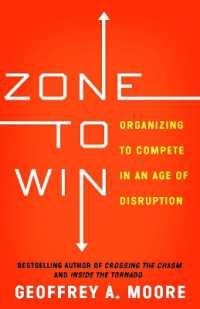- ホーム
- > 洋書
- > 英文書
- > Politics / International Relations
Full Description
Winner, 2024 Richard E. Neustadt Book Prize, American Politics Group, Political Studies Association
The president of the United States is at once holder of the highest elected office and commander in chief of the armed forces. How do upcoming elections influence presidents' behavior during wartime? How do presidents balance perceptions of the national interest with personal political interests?
War on the Ballot examines how electoral politics shaped presidential decisions on military and diplomatic strategy during the wars in Korea, Vietnam, and Iraq. Drawing on a wealth of declassified documents and interviews with senior officials and military officers, Andrew Payne reveals the surprisingly large role played by political considerations during conflicts. He demonstrates how the exigencies of the electoral cycle drove leaders to miss opportunities to limit the human and financial costs of each war, gain strategic advantage, or sue for peace, sometimes making critical decisions with striking disregard for the consequences on the ground. Payne emphasizes the importance of electoral pressures throughout the full course of a conflict, not just around the initial decision to intervene. He shows how electoral constraints operate across different phases of the political calendar, going beyond the period immediately preceding a presidential election.
Offering a systematic analysis of the relationship between electoral politics and wartime decision-making, this book raises crucial questions about democratic accountability in foreign policy.
Contents
Acknowledgments
Introduction
1. Presidents, Politics, and War
2. Korea: Truman, Eisenhower, and America's First Limited War
3. Vietnam: Lyndon Johnson and the "Americanization" of the War
4. Vietnam: Richard Nixon and the "Vietnamization" of the War
5. Iraq: George W. Bush and the Decision to Double Down
6. Iraq: Barack Obama and the Endgame
Conclusion
Notes
Bibliography
Index







